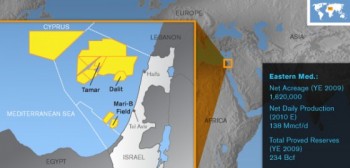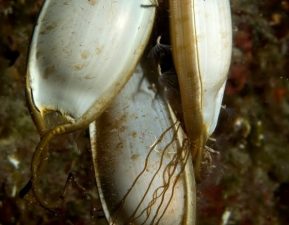 Drilling for undersea gas in Cyprus’s Exclusive Economic Zone may have serious impacts on marine life.
Drilling for undersea gas in Cyprus’s Exclusive Economic Zone may have serious impacts on marine life.
Like 0ther-energy poor countries in the eastern Mediterranean basin, including Israel and Lebanon, who are now in a serious dispute over energy reserves located there, the Republic of Cyprus has shown interested in exploiting the undersea natural gas fields that lay near its shores. Last July, the Republic of Cyprus’s Commerce Minister Antonis Paschalides expressed his concern involving his country’s exploration for natural gas in what is known as the Exclusive Economic Zone (EEZ) south-east of Cyprus, otherwise known as Block 12. In an interview in the Cyprus Mail, Paschalides expressed concerns that drilling for natural gas could result in severe environmental damage.
 Map of Cyprus EEZ and Israeli gas fields
Map of Cyprus EEZ and Israeli gas fields
Now it appears the university researchers like Dr. Constantinos Hadjistasou of the University of Cyprus, are expressing fears that drilling for natural gas in the Cyprus Exclusive Economic Zone (EEC) does pose “serious threats to marine flora and fauna.”
Dr. Hadjistasou who specializes in conventional energy and low carbon release technologies warns that: “Bearing in mind that the potential hydrocarbon reserves are offshore and rather deep, this makes the task of protecting the marine environment even more difficult in the case of an accident. The exploitation of natural resources is inextricably linked with the environment, the food chain and sustainable development.”
Dr. Hadjustasou went on to say that due to these concerns, “we rate the protection of the natural environment as high as the rational exploitation of the mineral wealth of a country.”
Indeed the researcher’s concerns have grounds for validity as the Republic of Cyprus depends a lot on the sea for both food sources and for the country’s important tourism industry. Concerns for marine life on the Mediterranean seabed have also been expressed by marine ecologists and oceanographers Israel who have been involved in projects to explore and map the eastern Mediterranean seabed in a joint project carried by the University of Haifa’s marine ecology and oceanography departments, and researchers with the American Nautilus marine exploration projects, whose various undersea explorations include finding the remains of the ill fated passenger vessel H.M.S. Titanic .
Another well known Israeli marine ecologist is Dr. Ruth Yahel who carries out undersea ecological research for the Nature and Parks Authority (NPA). Her concern for the state of the eastern Mediterranean’s undersea ecological environment is such that she was quoted as saying that:
“Either we can improve the Med’s overall condition, or we will wind up losing control of the sea’s environment, which will have a major impact on us, from both a health as well as economic standpoint.”
Like Dr. Hadjistasou, Dr. Yahel is also concerned about the impact caused to the marine life by undersea energy exploration and drilling. As both Cyprus and Israel have long Mediterranean coastlines (Cyprus is completely surrounded by the Med), the future of the Mediterranean Sea’s “flora and fauna” is an issue that could eventually be much more important than any energy supplies brought up from it.
Read more on eastern Mediterranean environmental and energy issues:
Cyprus Fears Environmental Impact of Undersea Gas Drilling
Lebanon Challenges Israel’s Natural Gas Borders at Sea
Israel Ecologist says Mediterranean Needs More Environmental Protection
Titanic Ship Leads Mediterranean Sea Floor Research Mission From Israel


